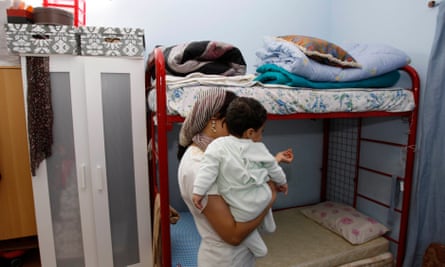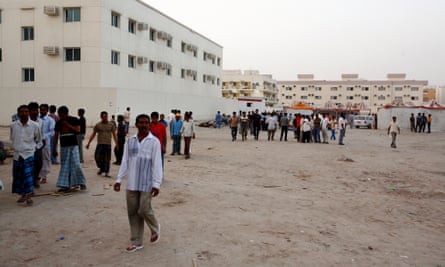As spring arrives, countless working-age men and women in Uzbekistan traditionally move abroad in search of work.
But this year, the annual migration is taking place against the backdrop of economic stagnation in the main regional labour market, Russia, and grumbles among officials in Moscow about an apparent migrant-driven spike in crime.
During a recent trip to Moscow in the hope of negotiating simplified migration rules for Uzbek citizens, the country’s president Islam Karimov failed to secure a deal, meaning many potential migrants are now looking elsewhere for work.
According to Russia’s official migration data for January, there were 1.9 million Uzbeks working in Russia, marking a 15% drop from the same period in 2015. The central bank in Moscow has also said that remittances to Uzbekistan have plummeted, totalling $3bn in 2015, down from $5.6bn the year before.
April and May are usually the months when most start leaving for Russia. But for Tashkent residents Suyun Usmanov and his wife, however, March was the month they decided to return home. Usmanov said that finding a job with a worthwhile salary has become tough in Russia.
“Migrant labourers can normally expect [monthly] pay of 20,000-30,000 roubles [around £315],” he said, “but if you want to have anything left over to send home, you need to make at least 40,000-45,000 roubles per month.”
The cost of living in Russia has become much more expensive following last year’s introduction of a new work permit. Obtaining the document requires migrants to undergo tests for HIV, tuberculosis, drug addiction and skin diseases.
Permit holders must also buy health insurance, obtain a taxpayer identification number and pass an exam testing their knowledge of the Russian language, history and laws. All this has to be done within one month or applicants face fines of 10,000 roubles.

‘Crimewave’
Russian government officials have started to speculate that these financial pressures are driving some migrants to crime.
At the end of March, president Vladimir Putin met top security officials to demand that more be done to contain what he described as a crimewave. “The unremitting crime rates among foreign citizens are causing serious concern, particularly since crimes of this nature draw a lot of public attention,” Putin told officials.
Nikolai Patrushev, secretary of Russia’s security council, also said there had been 58,000 recorded crimes committed by foreigners in 2015, an almost 6% increase on the previous year.
Moscow chief prosecutor Sergei Kudeneyev told Moskovsky Komsomolets newspaper in an interview last year that citizens of former Soviet Central Asian nations were responsible for committing the bulk of crimes attributed to foreigners in 2014. “If you create a ranking of criminality, you will find citizens of Uzbekistan at the top. They have committed 2,522 crimes; next is Tajikistan, with 1,745 crimes; and in third place there is Kyrgyzstan, whose citizens committed 1,269 crimes,” Kudeneyev said.
But migrant labourers are themselves often targets of crime, be it physical intimidation at the hands of gangs, or being defrauded by unscrupulous employers.
According to Anvar Nazirov, a political analyst in Tashkent: “Russian companies often use grey schemes. There is no transparency and they are often corrupt, which pushes migrants toward criminality. The conditions are not right for migrants to legalise their status and get above-board employment.”
Closer to home
Back home, Uzbek authorities are not making things any easier for migrants.
Local media reported that a deal was being negotiated to streamline requirements for Uzbek labourers wanting to work in Russia. But 2015 came and went without a deal. Karimov’s visit to Moscow last month brought no breakthroughs on this front either. Instead, the focus of relations has been on increasing exports of Uzbek produce to Russia and possible oft-rumoured arms deals.
All this is compelling many Uzbeks to consider other options. Nearby Kazakhstan has long been a favoured alternative – cotton harvesting starts in the autumn and pays better than the same work in Uzbekistan, while a booming construction industry attracts out-of-work labourers.
Sarvar Hamidjanov, 22, first went to Kazakhstan when he was 17. Now, he and another nine natives of the city of Andijan have jobs as woodworkers at a furniture factory in Almaty. The monthly salary is $500, while board and food are paid for by the employer.
“I like working here,” Hamidjanov said. “The locals are very tolerant toward us, and we learned Kazakh very quickly. Our stuff sells well here. A couple of years ago, I went to Russia to earn some money, for about three months, but I couldn’t get used to it, so I came back to Kazakhstan,” he said.
Hamidjanov said that once he puts aside enough money, he wants to open a furniture business in Andijan.

Looking east
But as economic troubles spread across the former Soviet Union, the United Arab Emirates has started drawing more interest from workers too.
Gulnoza, who asked for her surname not to be published, said she and her husband worked at a supermarket in Dubai for five years. Every month, they earned $3,000 between them. Out of that, $500 went toward rent for accommodation.
“There are enough jobs to go around in the UAE, so that’s why many of our people work here. The main thing is not to break the migration laws, and they will leave you alone. With the money we earned here, we were able to buy an apartment and a car back home,” she said.
Growing numbers are also heading to Turkey. According to recent estimates there are now around 50,000 Uzbeks living and working there. But that destination has been gravely complicated by the war in Syria, meaning some migrants returning home for holidays are subjected to interrogations upon arrival because of the government’s concern about keeping a tight lid on Islamic radicalism.
But the increasingly popular country among all emerging work destinations for Central Asian workers is South Korea, where many migrants work primarily in factories. Salaries in South Korea for Uzbeks are said to vary between $1,500 to $2,000 per month.
In an interview with a Tashkent television station, the head of the Uzbek agency for foreign labour migration, Ulugbek Nazarov, said 16,500 Uzbeks are officially registered as working in South Korea.
Looking to capitalise on this trend, in March the two countries signed a tentative memorandum of understanding to allow for greater numbers of Uzbeks to work in South Korea.
A version of this article first appeared on Eurasianet.org

Comments (…)
Sign in or create your Guardian account to join the discussion